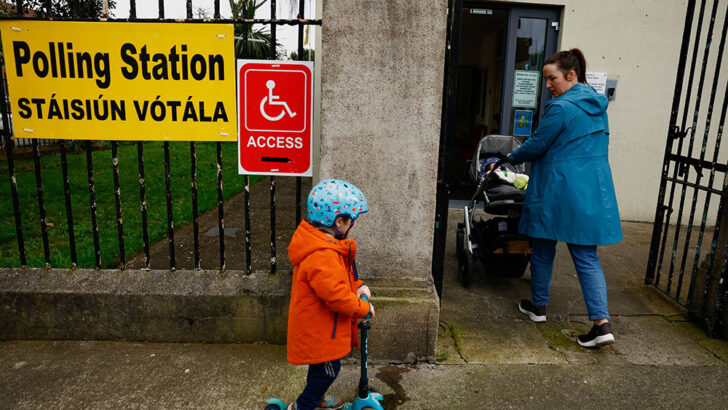Tis a tale of two days I have for you – a Saturday and a Thursday. If Ireland had beaten England at Twickenham last Saturday it would have been the icing on the cake, after that day’s stunning win for the No side in the referenda. But the cake is more important than the icing (unless it’s carrot cake) so that victory was sweet.
On Saturday with Colm Ó Mongáin (RTÉ Radio 1) the news report spoke of a “definitive trend” and of the proposals being “comprehensively defeated”. The presenter described it as “a bad day for the Government and most [italics added] of the opposition”.
Indeed, apart from Aontú and some independents, the so-called ‘opposition’ has questions to answer though they spent much of their post-result media time slamming the Government for a bad campaign with bad wording.
One of the quirkiest aspects of the day was the presence of miraculous medals in the ballot boxes. Only in Ireland! Colm Ó Mongáin said it was more a case for St Jude for the Yes side.
Strangely the panel was comprised entirely of Yes supporters, though No campaigners Senators Michael McDowell and Tom Clonan were interviewed later. Minister of State Peter Burke (FG) described the result as “a strong blow to the body politic” and raised questions about whether some NGOs were “reflective of the communities we live in”.
Later Sen. McDowell referred to “two dud amendments” while Sen. Clonan spoke of a “huge moral victory” for people with disabilities and their carers (unlike Sen. McDowell he had not campaigned on what became known as the ‘family referendum’).
I’d suggest that these senators, along with other independent voices, swung the middle ground for the No vote, while commentators like David Quinn, Sen. Rónán Mullen and Maria Steen ensured a No vote from more traditional or conservatively minded voters.
On the TV News at One (RTÉ One) reporters spoke from various count centres. Mary Regan said there was no majority for Yes anywhere in Munster. I wasn’t surprised at an earlier report that the result was on a knife edge in Greystones while the rest of Co. Wicklow went for a double No.
On the Referendums 2024 (RTÉ One) programmes that day, the trend towards No was analysed to the hilt. Sen. McDowell queried the late leaking (by the Government side, he believed) of the Attorney General’s advice – too late for scrutiny in the broadcast media because of the moratorium.
The Saturday vote was a victory for those of a socially and/or constitutionally conservative disposition, but there are other clouds ahead. The previous Thursday RTÉ reported that he Oireachtas Committee on Assisted Dying is set to recommend that both assisted suicide and euthanasia be introduced in Ireland. Both! The full report is due in late March, so you’d wonder about this revelation and whose agenda this advance news served.
Drivetime (RTÉ Radio 1, Thursday) was one of many shows that covered it. Janie Lazar, End of Life Ireland chairperson, welcomed the news but obviously thought it didn’t go far enough – honest but something of an own goal.
If limitations are set, she argued, what about the people who don’t meet the criteria? What about, even years ahead of any expected death, their quality of life is “unacceptable”, and pain can’t be relieved – whether physical, mental or even spiritual? Would that really be fair? That was pretty broad – beware any dark nights of the soul.
Prof. Des O’Neill, consultant geriatrician, found the proposals disturbing. He believed the “whole impulse of care” would be undermined. It would alter how we view caring, aging and dying. He questioned if, as part of their “repertoire as doctors”, they should be prepared to “kill people” (a spade called a spade).
Ms Lazar wanted the debate brought back to the individual and choice but Dr O’Neill saw this as a neo-liberal approach, valuing autonomy over everything else. He said we have to consider such matters in the light of what it does to the rest of society, see it on the broader canvas.
A similar point was made earlier in the day by a young fella called Brendan on Lunchtime Live (Newstalk). Adjusting an old saying, he suggested that hard cases make bad laws which in turn make more hard cases. There was quite a variety of views from callers for and against – well worth listening back to that discussion.


 Brendan O’Regan
Brendan O’Regan - A woman arrives with children at a polling station on the day of a referendum on changes to the Irish constitution called the Family Amendment and the Care Amendment, in Dublin, March 8. Photo: OSV News/Reuters, Clodagh Kilcoyne
- A woman arrives with children at a polling station on the day of a referendum on changes to the Irish constitution called the Family Amendment and the Care Amendment, in Dublin, March 8. Photo: OSV News/Reuters, Clodagh Kilcoyne 